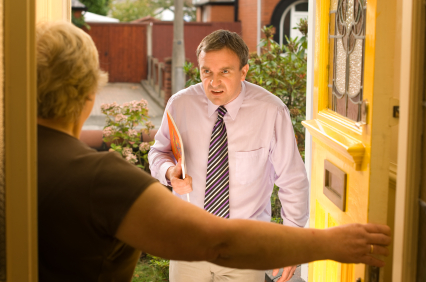A funny thing happened to me as I was working around the house one Sunday. A salesman was going door to door in my neighborhood, trying to sign people up for a local TV/Internet provider. The reason it’s funny is that my house was already a client of that particular provider — he was trying to sell to someone who was already a customer.
We had a good laugh about it, and he went on his way, but it was a good reminder for me that I wasn’t being smart in the house. I was by myself in the middle of the day, with the security system off, and my guard dog was snoozing in the sunlight on the sofa in the den.
Here are several tips to consider, and to follow, if you have a door-to-door salesman come to your house, courtesy of the National Consumers League:
Stay Safe
- Be very cautious about allowing people into your home unless you have requested the sales visit or are familiar with the company.
- If you are alone, don’t let anyone in your home.
- Make sure minors alone at home do not open doors to strangers, ever.
Be Smart
If your community requires door-to-door salespersons to have permits, ask to see it and don’t do business with anyone without it.
Be skeptical if you notice warning signs such as:
- The salesperson is in a contest and will win prizes for making sales.
- The salesperson contends that there has been a trend of burglaries in your neighborhood yet you’ve never heard of any.
- The salesperson asks you to be a model home for others in your neighborhood.
- Scams come up on the first page of search results page if you look the company up online.
- The company has changed their name frequently or they do business in other states under different names.
- The salesperson refuses to take no for an answer and uses high-pressure tactics, such as intimidating or threatening customers or refusing to leave until you say you will buy something.
It’s also important to always read before you sign a sales agreement, get a receipt for any purchase, and never pay in cash.
Don’t assume you can cancel an order. Yes, by law, you should be able to cancel if the order is more than $25. But unethical companies may not provide real telephone numbers to call in order to cancel an order.
Be Aware
If you suspect that the salesperson is part of a traveling sales crew, don’t let them into your home and don’t buy their products.
Contact the police to notify them that a crew is operating in your neighborhood. Provide them with the name of the company and the product being peddled.
Standards Ethical Door-to-Door Salespersons Should Follow
Keep in mind the following guidelines for ethical sales:
- Offers should be clear, so consumers understand exactly what they are buying and how much they will have to pay.
- The order form should clearly describe the goods and quantity purchased, the price and terms of payment, and any additional charges.
- Recipients and contracts should show the name of the sales representative and his or her address or the name, address and telephone number of the firm whose product is sold.
- All salespersons should promptly identify themselves to a prospective customer and should truthfully indicate the purpose of their approach to the consumer, identifying the company or product brands represented.
- A salesperson should obey all applicable federal, state and local laws.
- A salesperson should explain the terms and conditions for returning a product or canceling an order.
- Salespersons should not create confusion in the mind of the consumer, abuse the trust of the consumer, nor exploit the lack of experience or knowledge of the consumer.
- Salespersons should respect the privacy of consumers by making every effort to make calls at times that best suit the customer’s convenience and wishes.
- It is a consumer’s right to end a sales call and salespersons should respect that right.
- All references to testimonials and endorsements should be truthful, currently applicable, and authorized by the person or organization quoted.
- Product comparisons should be fair and based on substantiated facts.
- A salesperson should not disparage other products or firms.
- A salesperson should not try to make the consumer cancel a contract made with another salesperson.
The most important thing — and I can’t stress this enough– is if a salesperson is telling you something that sounds wrong, it probably is. Ask them to back it up with hard, verifiable data. Be safe and good luck!

